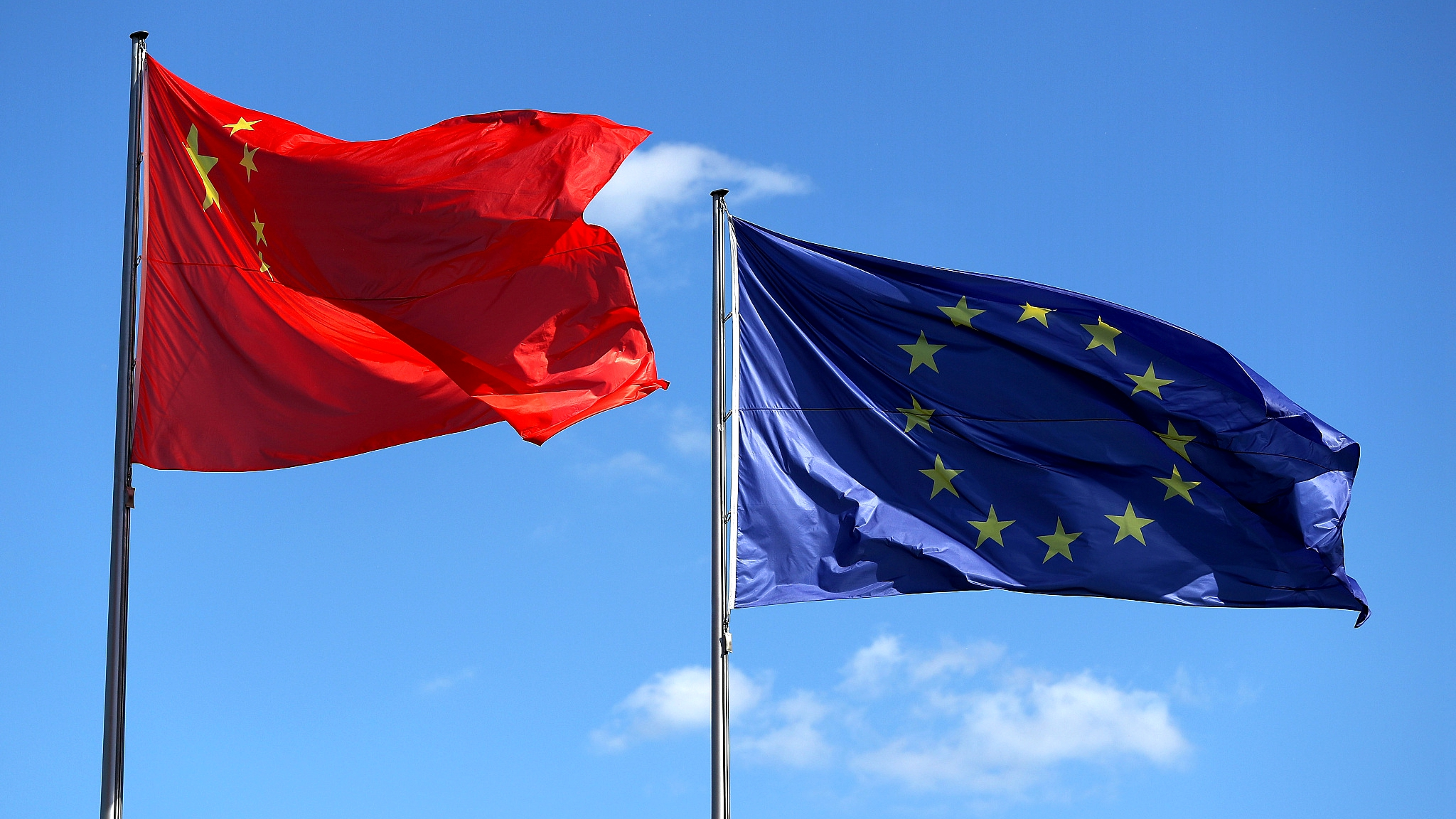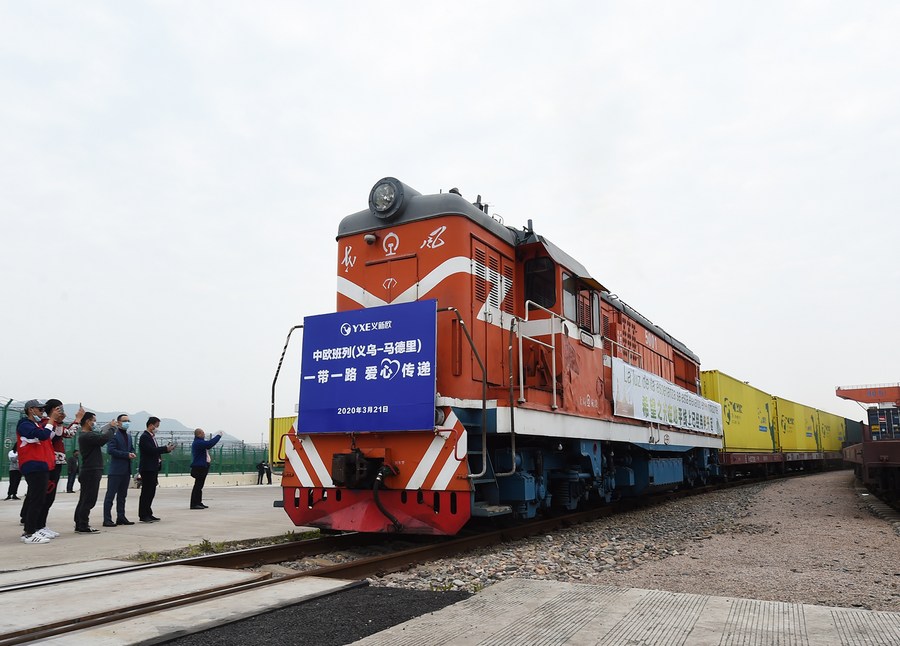
Editor's note: Aftab Siddiqui is an independent analyst based in London. The article reflects the author's opinions, and not necessarily the views of CGTN.
When leaders commit to free trade, they create growth opportunities for their economies, for their businesses, for their people. They take decisions to help develop new economic prospects and level the playing field for billions of their citizens.
That is exactly what was achieved when alongside the EU leadership, Chinese President Xi Jinping, his French counterpart Emmanuel Macron, and German Chancellor Angela Merkel met over a video call to finalize the Comprehensive Agreement on Investment (CAI).
As a multibillion-euro investment deal, this is one of the most wide-ranging global economic deals agreed by the EU and the most ambitious agreement that China has ever concluded with a third country.
Two of the world's largest economies have strengthened their trade relationship with an agreement to build on daily trading averages of over 1 billion euros ($1.22 billion) a day according to the European Commission.
They have also agreed to work together to use CAI as a platform to further strengthen a rules-based multilateral world order. Both parties reiterated their commitments to the principles of World Trade Organization (WTO), International Labor Organization (ILO) and the all-important international treaty on climate change – Paris Agreement of 2016.
What does CAI offer to the EU?
Over the last two decades, foreign direct investment from the EU to China has crossed 140 billion euros ($170 billion), a significant amount by any standards. While EU firms have invested across several sectors, their primary focus has been auto manufacturing and chemicals.
However, European multinationals fully appreciate that the "Chinese Opportunity" is much bigger than these two sectors especially as China continues to invest in self-sufficiency across a large swathe of critical sectors especially telecoms, technology, and energy. With China the only economy in the world posting GDP growth rate of over 6 percent despite the head winds of a global pandemic and shrinking economies, the EU's appetite for investment opportunities in China is growing.
For the EU, this agreement further improves market access conditions for European companies looking to invest in China. It opens up new sectors and regions for investment and delivers a clearer, more transparent set of regulations that introduce a level of predictability for potential investors.

A China-Europe freight train bound for Madrid of Spain, which carries two containers of medical supplies and other goods, departs the city of Yiwu, east China's Zhejiang Province, March 21, 2020. /Xinhua
A China-Europe freight train bound for Madrid of Spain, which carries two containers of medical supplies and other goods, departs the city of Yiwu, east China's Zhejiang Province, March 21, 2020. /Xinhua
It establishes a formal and binding framework for discussion and resolution of any disputes or problems EU investors might face in China and puts in place a mechanism for state-to-state dispute resolution for EU multinationals operating in China.
EU investors can now make long-term plans with huge level of confidence in commitments underwritten by key decision makers within the Chinese government. EU-based companies can now explore opportunities across financial services, private health care, real estate, hi-tech cloud services, environmental services, air, and maritime travel services in a market of 1.4 billion people and the fastest growing economy in the world.
What does CAI offer to China?
China is actively developing global trade alliances as part of a strategy for opening up its economy and contributing to the development of a more cooperative and connected world. It has liberalized some sectors for foreign investment and ownership which has helped improve its World Bank "Ease of Doing Business" ranking to 31 which places it a notch above France.
The CAI is therefore a far-reaching accomplishment for China. It follows the successful precedent set by the signing of the Regional Comprehensive Economic Partnership. Reducing bureaucratic red tape and enabling Chinese firms to operate freely in countries across the EU as well as in China, the CAI will serve as a road map for Chinese business operations working towards global market access standards.
The ambitious provisions of this multibillion-euro deal are a first for any international Chinese trade deal. It offers Chinese businesses an opportunity to develop strategic joint ventures with EU firms in sectors ranging from large-scale manufacturing to fast-growing renewable energy. Although it excludes public services and critical EU infrastructure.
The agreement cements a values-based investment relationship underpinned by sustainable development principles to provide a level playing field for businesses from both, including further ratification of ILO conventions by China.
What next?
Agreed under the EU presidency of German Chancellor Angela Markel, the CAI will now be ratified by the European Parliament under the next EU president, Emmanuel Macron, the president of France.
Although the incoming Joe Biden administration may wish to influence the ratification process, the general consensus across the EU parliament seems to be towards getting it done. Indeed, the terms agreed under CAI reflect "Phase One" of the trade agreement between the Trump administration and China signed in January 2020.
President-elect Biden may be well-advised to take the view that since both the EU and the U.S. have reached their own independent agreements with China, it would now help turbo-charge the world economy if these three major economies moved away from trading in disputes and conflicts and started trading in goods and services.
The CAI has enabled the EU and China to strengthen the core of their relationship based on investment in each other's economy and mutual respect for a rule-based world order. This potentially sets a strong precedent for both partners to see convergence of their policy positions on global economic and diplomatic issues.
(If you want to contribute and have specific expertise, please contact us at opinions@cgtn.com.)

